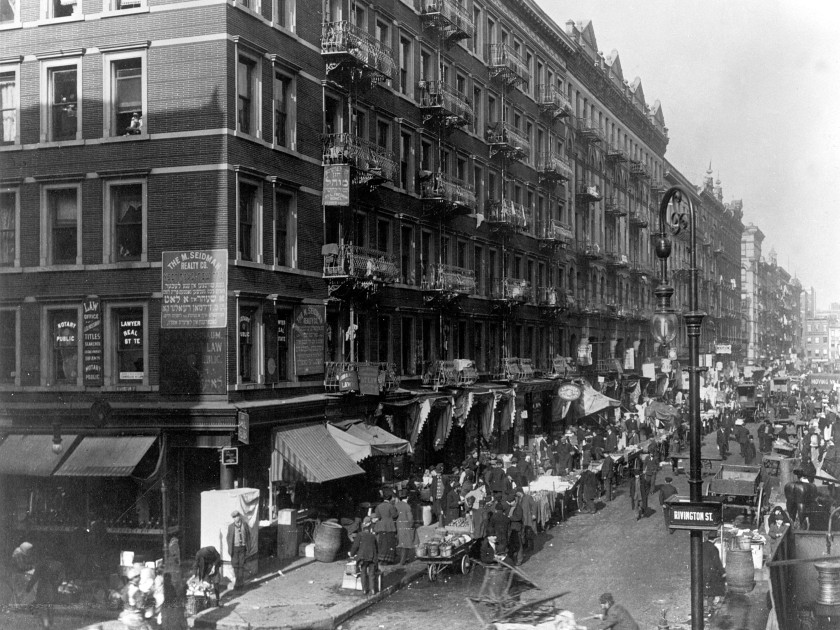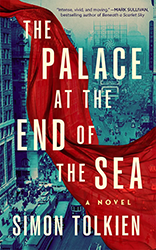Join a community of readers who are committed to Jewish stories
Sign up for JBC’s Nu Reads, a curated selection of Jewish books delivered straight to your door!

Lower East Side, New York City, 1909
I have long been interested in Jewish history. My stepmother was the first to tell me about the Holocaust and the horror of it made a great impression on me when I was a boy. My wife, Tracy is half Jewish and my son, Nicholas wrote, directed, and produced an off-Broadway play called Terezin, focused on the Nazis propaganda attempts to deceive the outside world about the nature of the concentration camps.
My third novel, The King of Diamonds, hinged on a diamond dealer who may have helped Jews to find safe passage out of occupied Belgium; or who may instead have betrayed them to the Germans, in order to steal the jewels that they hid in their clothing when they escaped. This storyline enabled me to explore the fate of the twenty-five thousand Jews who were deported to Auschwitz from the transit camp at Mechelen near Antwerp between 1942 and 1944.
In my new book, The Palace at the End of the Sea, I return to the twentieth century Jewish experience, this time on the other side of the Atlantic. The first sentence reads: “He was eleven when he was taken.” He is Theo Sterling, my protagonist, and it is his Jewish grandfather whom he has never met before, immensely tall with a flowing white beard, who takes him from outside his home. They embark on a rapid, terrifying walk through the streets of 1928 New York City, until they reach the Lower East Side and the tenement apartment where Theo’s grandparents scratch out a living from piecemeal tailoring. His grandmother has lovingly cooked him a kosher meal — blintzes, knishes, and cholent — and sitting on the other side of the table, his grandfather tells him that his name is Stern and not Sterling. He shows Theo photographs of ancestors he never knew he had, faraway across the great sea, who died in violent, terrifying pogroms perpetrated by non-Jews. But then this overwhelming introduction to his Jewish heritage is abruptly cut short, when Theo’s father, Michael, forces his way into the apartment and takes his son back.
The Palace at the End of the Sea is about a young man’s search for identity and self.
Afterward, Michael makes Theo promise to “Forget it all, like it was a bad dream.” Just as he himself has tried to do ever since his parents cut him off, treating him as if he was dead after he married a non-Jew. Michael prides himself on having become an American and not a Jew, a man without a past.
But Theo can’t forget. He never sees his grandparents again, but the seed that they planted in his mind and heart germinates and grows as the years pass, manifesting itself in different ways.
The Great Depression grips New York City, and Theo is appalled by the poverty and misery of the unemployed. He sympathizes with the Jewish workers who are paid starvation wages in his father’s garment factory and can’t help but admire their courage when they risk everything to go on strike and are beaten by the police, even as he understands that his father can’t afford to pay them more and that the strike threatens to destroy his father’s business. Theo reacts instinctively against injustice, remembering how his grandfather called his father “An apostate, a Jew who preys on his own people like a wolf in the night.”
Later, at school in England, Theo sees newsreels in the cinema that make him understand that the pogroms his grandfather told him about, do not just belong to the frozen sepia of photograph albums. They are happening now to Jews in Germany. He feels a visceral response and a need to act that culminates in his decision to risk his place at school to join his communist friend, Esmond, in a successful demonstration against a huge British Union of Fascists rally in London.
Years before, on that momentous summer afternoon, Theo’s grandfather told him that you have to be true to who you are. The words stay with Theo, becoming a lodestar for his life. He won’t back down from a challenge and insists on doing what he thinks is right, regardless of the consequences to himself. And it is this courage and determination linked with a perhaps naïve belief that he can change the world, that ultimately leads Theo to take the same fateful path as a thousand other Jewish Americans and volunteer to fight fascism in Spain.
The Palace at the End of the Sea is about a young man’s search for identity and self. He comes to understand that his grandfather “Gave me a sense that I was part of something bigger than myself, that I belonged somewhere.”
And so that distant childhood day becomes the defining moment in his life.

The Palace at the End of the Sea by Simon Tolkien
Simon Tolkien is the author of No Man’s Land, Orders from Berlin, The King of Diamonds, The Inheritance, and Final Witness. He studied modern history at Trinity College, Oxford, and went on to become a London barrister specializing in criminal defense. Simon is the grandson of J.R.R. Tolkien and is a director of the Tolkien Estate. In 2022 he was named as series consultant to the Amazon TV series The Rings of Power. He lives with his wife, vintage fashion author Tracy Tolkien, and their two children, Nicholas and Anna, in Southern California. For more information, visit www.simontolkien.com.